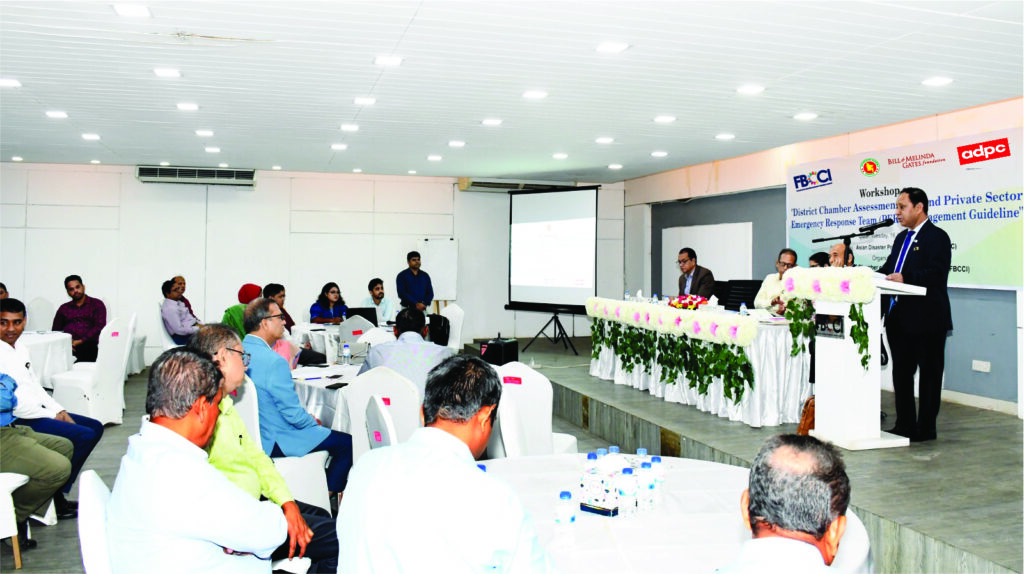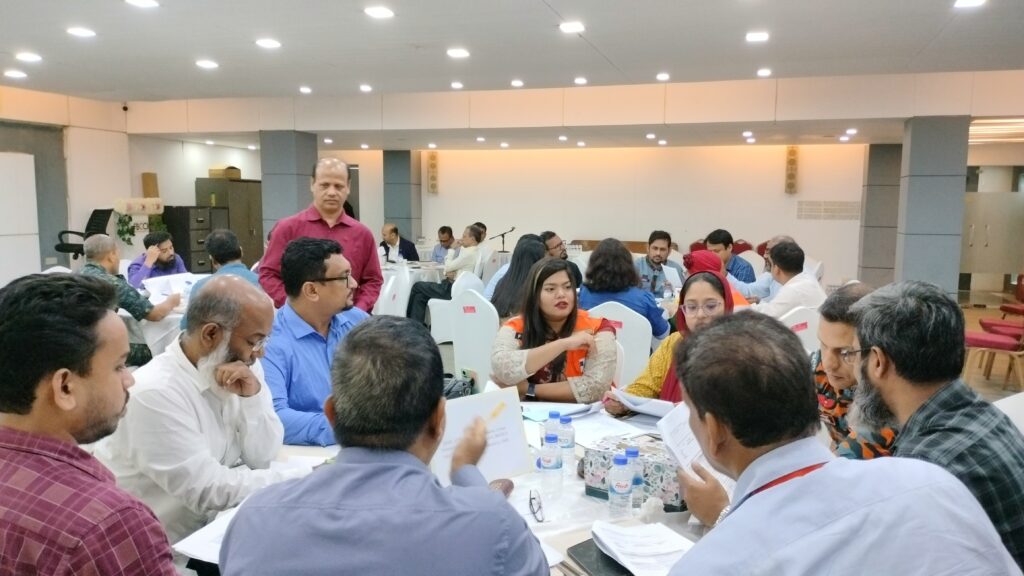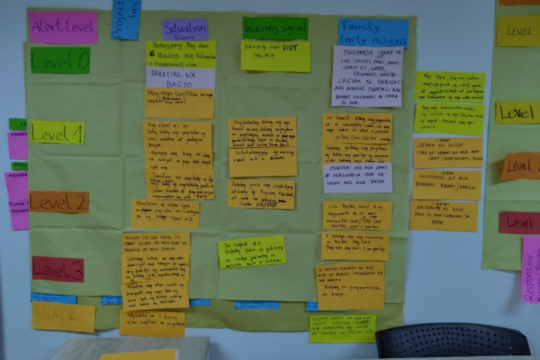In the realm of disaster management, the involvement of the private sector has emerged as a critical factor in enhancing preparedness and response capabilities. Historically, disaster management has primarily been the domain of government agencies and humanitarian organizations. However, the complexities of modern crises—ranging from natural hazards to industrial accidents—demand a more comprehensive approach. The private sector, with its resources, expertise, and logistical capabilities, is increasingly seen as an indispensable partner in these efforts.
The Federation of Bangladesh Chamber of Commerce and Industry (FBCCI), the Apex and influential private sector forum in Bangladesh, exemplifies this shift. By leveraging its extensive network of District Chambers of Commerce and Industries (DCCI) across the country, FBCCI is driving initiatives that integrate private sector resources and knowledge into district-level disaster preparedness strategies.
A prime example of this collaboration is the Bangladesh Preparedness Partnership (BPP), a key initiative led by the Ministry of Disaster Management and Relief (MoDMR) with technical support from the Asian Disaster Preparedness Center (ADPC) and funding from the Bill & Melinda Gates Foundation. FBCCI’s involvement as a critical partner in BPP underscores its commitment to enhancing disaster preparedness through private sector engagement.

Collaborative Partnerships: A Model for Success
FBCCI in collaboration with ADPC hosted a pivotal workshop in July under the Bangladesh Preparedness Partnership (BPP) for reviewing and improving key tools, such as the enhanced District Chamber Capacity Assessment Tool, which evaluates emergency response capabilities of safety cells in the BPP’s three working district chambers located in Bagerhat, Kurigram, and Bandarban. Additionally, the Private Sector Emergency Response Team (PERT) Management Guidelines were reviewed to ensure they are actionable and tailored to the needs of private sector entities. These tools and guidelines are designed to evaluate and improve the emergency preparedness of district chambers and ensure that private sector entities are well-equipped to handle crises.
The workshop was a testament to the collaborative spirit driving this effort. The workshop brought together a diverse array of key stakeholders, including government officials, business leaders, and representatives from organizations such as MoDMR, Department of Disaster Management (DDM), Fire Service and Civil Defense (FSCD), Department of Inspection for Factories and Establishment (DIFE), Bangladesh Garment Manufacturers and Exporters Association (BGMEA), Bangladesh Knitwear Manufacturer and Exporters Association (BKMEA), Bangladesh Small and Cottage Industries Corporation (BSCIC), Bangladesh Export Processing Zone Authority (BEPZA), Bangladesh Investment Development Authority (BIDA), Small and Medium Enterprise Foundation (SME Foundation), Red Crescent Society, National Alliance of Humanitarian Actors, Bangladesh (NAHAB), Bangladesh Scouts, Institute of Disaster Management and Vulnerability Studies of the University of Dhaka, Bangladesh University of Health Sciences, and Dhaka North and South City Corporations. The workshop featured notable figures such as FBCCI Senior Vice-President Mr. Md. Amin Helaly, MoDMR Additional Secretary Mr. K M Abdul Wadud, and ADPC Technical Lead Dr. Mona Chhabra Anand as distinguished guests. The inaugural session was chaired by FBCCI Vice-President Dr.Joshoda Jibon Deb Nath. Other distinguished attendees included FBCCI Director Mr. Niaz Ali Chisty, FBCCI Secretary General Mr. Md. Alamgir Hossain, FBCCI Safety Council Adviser Brig. General (ret’d) Abuy Nayeem Md. Shahidullah, ADPC Senior Program Manager Dr. Mohammad Ahsan Ullah, and ADPC Consultant Md. Anisur Rahman. They contributed to the discussions and presentations on the Bangladesh Preparedness Partnership and Private Sector engagement. The collaborative nature of the workshop allowed for the integration of diverse perspectives, leading to more robust and practical guidelines.
During the daylong workshop, participants engaged in detailed discussions on District Chamber Assessment tools and provided feedback through group discussion interactive questions and answers segments. Similarly, the sessions on PERT Management Guidelines involved a thorough review process. Brig. General (ret’d) Abu Nayeem Md. Shahidullah presented the draft guidelines which were scrutinized by participants across the three groups. This discussion aimed to ensure the guidelines were clear, actionable, and shared to the needs of private sector entities addressing emergency preparedness. The consultation underscored the importance of a collaborative approach to emergency preparedness. By leveraging the diverse expertise of the participants, the workshop made significant strides in refining both the District Chamber Assessment Tool and the PERT Management Guidelines. The feedback will contribute to a more resilient and effective emergency management framework, tailored to the unique challenges faced by the district institutions.

Process of Knowledge Transformation: Strengthening Local Capacity Through Private Sector Expertise
ADPC provided Technical Support to FBCCI as part of the BPP in equipping private sector entities to support disaster preparedness beyond providing resources. For instance, the establishment of “Safety Cell” in district chambers, as part of FBCCI’s Crisis Management Committee initiative, reflects a proactive approach to integrating private sector knowledge into local disaster management strategies.
These Safety Cells are designed to act as focal points for disaster preparedness and response at the district level. By tapping into the expertise and networks of local businesses, these cells can better support government efforts and build synergies for enhancing coordination and efficiency of emergency responses, as envisioned in the SOD 2019.
A Vision for the Future: Whole of Society Approach
The success of private sector partnerships in disaster preparedness lies in their ability to foster a “whole of society” approach which was undertaken as per the provision of the Standing Orders on Disaster (SOD 2019) and National Plan for Disaster Management 2021-2025. This approach emphasizes the importance of collaboration among all stakeholders—government, private sector, academia, and civil society—in building a resilient and responsive disaster management system.
FBCCI’s ongoing efforts, in partnership with MoDMR and ADPC, are paving the way for a more integrated and effective disaster preparedness framework. By harnessing the strengths of the private sector, these initiatives are setting a precedent for how collaborative approaches can enhance emergency preparedness and response at the district level.
A Call to Action
As the frequency and intensity of disasters continue to rise, the role of private-sector partnerships in disaster risk reduction and preparedness becomes increasingly vital. The collaboration between FBCCI, government agencies, and inter-governmental organizations like ADPC demonstrates the power of collective action in addressing the challenges of disaster management and moving forward. By building on the successes of initiatives like the BPP and fostering a culture of collaboration, we can strengthen the disaster preparedness culture of Bangladesh from the national to local level and ensure that business communities are better equipped to prepare to respond to and recover from any disaster. The future of disaster management lies in our ability to work together, leveraging the strengths of each sector to create a safer and more resilient society


